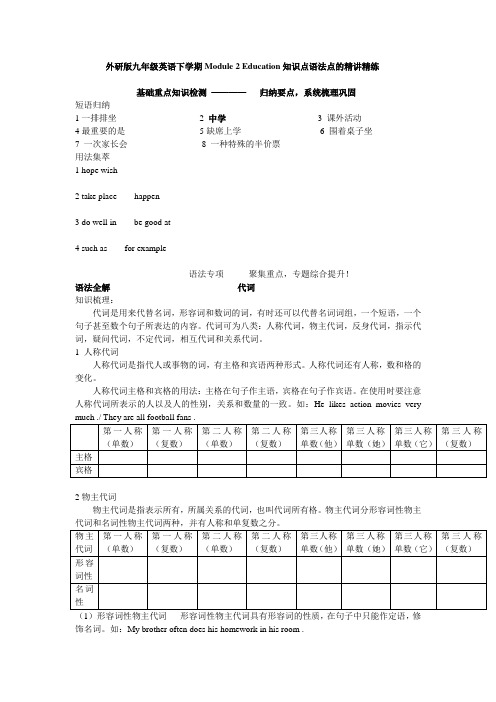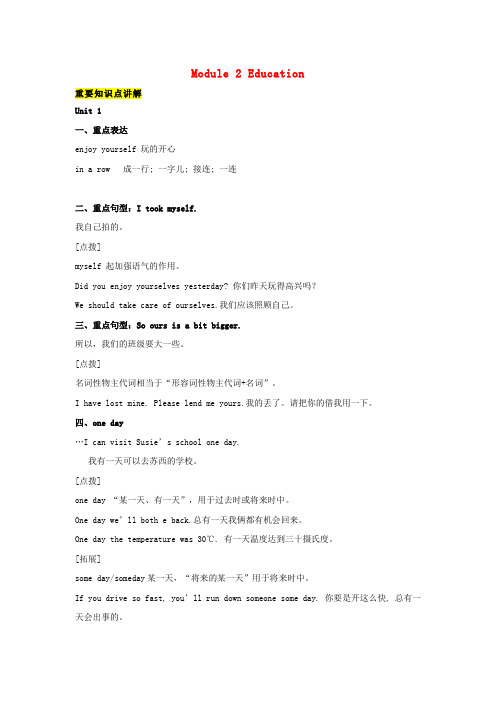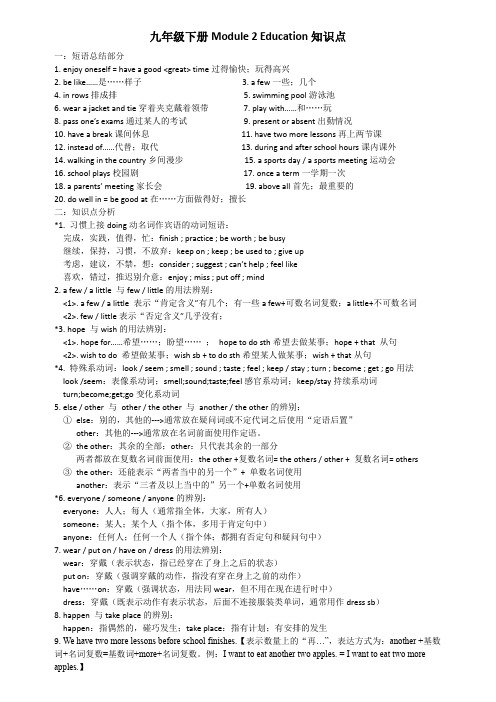九年级下Module 2 Education重点知识清单(教师版)
九年级下册英语m2知识点

九年级下册英语m2知识点九年级下册英语 M2 知识点在九年级下册的英语课程中,M2 是一个关键的模块。
这个模块涵盖了许多重要的知识点,帮助学生提高听、说、读、写的能力。
下面将介绍一些M2的重要知识点,包括语法、词汇、阅读理解等。
一、语法知识点1. 直接引语和间接引语:在交流中,我们经常需要引用他人的话语。
直接引语是直接复述别人的话,而间接引语是根据别人的话进行复述和报告。
学生需要了解如何将直接引语转换为间接引语,并在书面表达中正确运用这两种引语。
2. 倒装句:倒装句是英语语法中常见的一种句子结构。
它的基本形式是把谓语动词放在主语之前,用于强调、修辞或表示条件。
学生需要掌握倒装句的结构和用法,以便在写作和口语表达中灵活运用。
3. 过去完成时:过去完成时用来描述在过去某一时间或事件之前已经完成的动作或状态。
学生需要掌握过去完成时的构成和用法,能够正确使用过去完成时来表达过去的动作和事件。
二、词汇知识点1. 同义词和反义词:同义词是指在意思上相近的词语,而反义词则相反。
学生需要积累并理解常见的同义词和反义词,以提高阅读理解和词汇应用的能力。
2. 词根、前缀和后缀:学习词根、前缀和后缀可以帮助学生理解和记忆生词,也有助于他们学会通过词缀分析和拼写新词。
3. 习语和短语:习语和短语是英语中常见的固定搭配。
学生需要掌握常见的习语和短语,以便在交流中更准确地表达自己的意思。
三、阅读理解知识点1. 主旨大意:阅读理解中的主旨大意题要求学生在阅读文章后,确定文章的中心思想或主题。
学生需要通过理解文章的内容、标题和段落来确定主旨大意。
2. 推理判断:推理判断题要求学生通过阅读文章中的线索和信息,推断出某种结果或结论。
学生需要细致阅读文章,理解其中的暗示和隐含信息,并运用推理能力进行判断。
3. 细节理解:细节理解题要求学生根据文章中的具体细节,回答问题、填写表格或选择正确的答案。
学生需要仔细阅读文章,注意细节,并能够根据信息进行准确的回答。
九年级英语下册module2education模块语法聚焦

Module 2 Education代词和介词的用法1.I took them myself.我自己拍的(照片)。
2.So ours is a bit bigger.看来我们的班级大一些。
3.Everyone is wearing a jacket and tie!每个人都穿着夹克,戴着领带!4.We go to school every weekday from 8:45 am to 3:15 pm.我们每个工作日早上8:45去上学,下午3:15放学。
5.We have a large sports ground for football and tennis, where we can play both during and after school hours.我们有一个很大的运动场,可供学生课内外踢足球、打网球。
6.During the school year there are usually visits to museums and to camps for activities such as climbing and walking in the country.每个学年通常都会有参观博物馆的活动和露营活动,比如在乡村爬山和徒步等。
一、代词(一)代词的分类(二)代词的用法1.人称代词代替人或事物的代词是人称代词。
在句中作主语的人称代词叫主格,作宾语和表语的人称代词叫宾格。
[注意] 几个人称代词并列充当主语时,顺序如下:单数形式(二、三、一)①__________________;复数形式(一、二、三)②____________________2.指示代词(1)this和these用于指距离③________事物或人,that和those用于指④________事物或人。
(2)打电话时用that问对方是谁,用this进行自我介绍。
如:This is Mary speaking. Who's that?我是玛丽,你是谁?(3)that(those)可以代替前面提到的名词,以免重复,this(these)不能。
外研版九年级英语下学期Module 2 Education知识点总结语法点的精讲精练

外研版九年级英语下学期Module 2 Education知识点语法点的精讲精练基础重点知识检测————归纳要点,系统梳理巩固短语归纳1一排排坐______________ 2 中学______________ 3 课外活动_________4最重要的是___________ 5缺席上学_____________ 6 围着桌子坐__________ 7 一次家长会___________ 8 一种特殊的半价票________________用法集萃1 hope wish2 take place happen3 do well in be good at4 such as for example语法专项------- 聚集重点,专题综合提升!语法全解代词知识梳理:代词是用来代替名词,形容词和数词的词,有时还可以代替名词词组,一个短语,一个句子甚至数个句子所表达的内容。
代词可为八类:人称代词,物主代词,反身代词,指示代词,疑问代词,不定代词,相互代词和关系代词。
1 人称代词人称代词是指代人或事物的词,有主格和宾语两种形式。
人称代词还有人称,数和格的变化。
人称代词主格和宾格的用法:主格在句子作主语,宾格在句子作宾语。
在使用时要注意人称代词所表示的人以及人的性别,关系和数量的一致。
如:He likes action movies very2物主代词物主代词是指表示所有,所属关系的代词,也叫代词所有格。
物主代词分形容词性物主代词和名词性物主代词两种,并有人称和单复数之分。
饰名词。
如:My brother often does his homework in his room .(2)名词性物主代词名词性物主代词具有名词的性质,在句子中作主语,表语,宾语和定语。
它的意义相当于“形容词性物主代词+名词”,如:Mine=my +名词A 作主语,如: Our school is here ,and theirs is over there .B 作表语,如: These bikes are not ours ,but theirs .C 作宾语,如:He is using my knife .May i use yours ?D 与of 构成短语作后置定语,如: Jack is a friend of mine .3指示代词表示空间和时间远近关系的代词称为指示代词。
Module+2+Education+知识点总结+课件+2024-2025学年外研版英语九年级下册

注意: (1)until用在肯定句中,多与持续性的动词连用。如stand, wait,stay等,表示主句动作的终止时间。例如:
He stayed there until midnight. 他在那里逗留到深夜。 (2)until可用于否定句中,即not…until…意为“直到……才”, 常与非延续性动词连用。如open,start,leave,arrive等,强调 主句动作开始的时间。例如:
wish的用法: wish 作动词,也表示“想,希望”,但用法是有区别的。 (1)wish sb. sth. 表示“祝愿”。例如: (2)wish sb. to do sth. 表示“希望(某人)做某事”。 (3)“wish + (that) 从句”,表示不可能实现或实现的可能性 较小的愿望。
9. What are English schools like? 这里的be like意为“像……一样”,like是介词。这个句式是用来
11. If I pass my exams next year, I’ll stay here until I’m eighteen. until意为“直到……”,有下列用法: (1)作介词,后接时间名词,在句中作时间状语。例如: She waited there until 9 o’clock. 她在那里一直等到9点钟。 (2)作连词,后接从句,引导时间状语从句。例如: We waited until the rain stopped. 我们等到雨停了。
He is putting on his shoes. 他在穿鞋。 (3)in指穿的状态,意为“穿着,戴着”。但它不能作谓语,后 常跟表示颜色的词。例如:
She is in red today. 她今天穿的红衣服。
2023九年级英语下册Module2Education重点知识梳理(新版)

Module 2 Education重要知识点讲解Unit 1一、重点表达enjoy yourself 玩的开心in a row 成一行; 一字儿; 接连; 一连二、重点句型:I took myself.我自己拍的。
[点拨]myself 起加强语气的作用。
Did you enjoy yourselves yesterday? 你们昨天玩得高兴吗?We should take care of ourselves.我们应该照顾自己。
三、重点句型:So ours is a bit bigger.所以,我们的班级要大一些。
[点拨]名词性物主代词相当于“形容词性物主代词+名词”。
I have lost mine. Please lend me yours.我的丢了。
请把你的借我用一下。
四、one day…I can visit Susie’s school one day.我有一天可以去苏西的学校。
[点拨]one day “某一天、有一天”,用于过去时或将来时中。
One day we’ll both e back.总有一天我俩都有机会回来。
One day the temperature was 30℃. 有一天温度达到三十摄氏度。
[拓展]some day/someday某一天,“将来的某一天”用于将来时中。
If you drive so fast, you’ll run down someone some day. 你要是开这么快, 总有一天会出事的。
Unit 2一、重点表达twenty minutes away from my home 离我家二十分钟的路程instead of 代替;而不是above all 首要的是,尤其; 最重要的是be absent from 缺席a parents’ meeting家长会We go to school every weekday from 8:45 am to 3:15 pm.我们每天从上午8:45到下午3:15上学。
2014秋外研版九年级英语下册Module 2 Education知识点总结

九年级下册Module 2 Education知识点一:短语总结部分1. enjoy oneself = have a good <great> time过得愉快;玩得高兴2. be like……是……样子3. a few一些;几个4. in rows排成排5. swimming pool游泳池6. wear a jacket and tie穿着夹克戴着领带7. play with……和……玩8. pass one’s exams通过某人的考试9. present or absent出勤情况10. have a break课间休息11. have two more lessons再上两节课12. instead of……代替;取代13. during and after school hours课内课外14. walking in the country乡间漫步15. a sports day / a sports meeting运动会16. school plays校园剧17. once a term一学期一次18. a parents’ meeting家长会19. above all首先;最重要的20. do well in = be good at在……方面做得好;擅长二:知识点分析*1. 习惯上接doing动名词作宾语的动词短语:完成,实践,值得,忙:finish ; practice ; be worth ; be busy继续,保持,习惯,不放弃:keep on ; keep ; be used to ; give up考虑,建议,不禁,想:consider ; suggest ; can’t help ; feel like喜欢,错过,推迟别介意:enjoy ; miss ; put off ; mind2. a few / a little 与few / little的用法辨别:<1>. a few / a little 表示“肯定含义”有几个;有一些a few+可数名词复数;a little+不可数名词<2>. few / little表示“否定含义”几乎没有;*3. hope 与wish的用法辨别:<1>. hope for……希望……;盼望……;hope to do sth希望去做某事;hope + that 从句<2>. wish to do 希望做某事;wish sb + to do sth希望某人做某事;wish + that从句*4. 特殊系动词:look / seem ; smell ; sound ; taste ; feel ; keep / stay ; turn ; become ; get ; go用法look /seem:表像系动词;smell;sound;taste;feel感官系动词;keep/stay持续系动词turn;become;get;go变化系动词5. else / other 与other / the other 与another / the other的辨别:①else:别的,其他的--->通常放在疑问词或不定代词之后使用“定语后置”other:其他的--->通常放在名词前面使用作定语。
九年级下册英语m2u2的知识点
九年级下册英语m2u2的知识点九年级下册英语M2U2是我们学习英语的一篇重要教材。
在这个单元中,我们将学习关于健康饮食、身体部位以及日常活动的英语表达。
本文将介绍M2U2的重要知识点,帮助同学们更好地掌握这个单元的内容。
饮食与健康是M2U2的一个重点,我们会学习一些关于健康饮食的词汇和表达方式。
例如,我们可以学到一些食物名词,例如“fruit”(水果),“vegetable”(蔬菜),“meat”(肉类)等等。
此外,我们还要学习如何表达我们对食物的喜好和不喜欢,例如,“I like bananas.”(我喜欢香蕉。
)以及“I don’t like tomatoes.”(我不喜欢番茄。
)在学习这些表达方式时,我们还可以进行角色扮演,练习情境对话,以提高口语表达能力。
除了食物,我们还要学习一些与身体部位相关的词汇。
我们会学习一些基本的身体部位名词,例如“head”(头)、“arm”(手臂)、“leg”(腿)等等。
我们会学习如何用英语描述身体部位的位置和状况,例如,“I have a headache.”(我头疼。
)以及“My leg hurts.”(我腿疼。
)掌握这些词汇和表达方式,可以帮助我们更好地与医生进行沟通,描述自己身体不适的情况。
日常活动也是M2U2的另一个重要话题。
我们会学习一些关于日常活动的词汇和表达方式。
例如,我们可以学到一些动词,例如“play”(玩耍)、“swim”(游泳)、“read”(阅读)等等。
我们还会学习一些短语和句型,例如,“I like playing basketball.”(我喜欢打篮球。
)以及“I usually swim on weekends.”(我通常在周末游泳。
)通过学习这些内容,我们可以更好地描述自己的兴趣爱好和日常活动。
除了这些重要的知识点,M2U2还包含其他一些与健康和日常生活有关的内容,例如,我们会学习如何表达时间,如“in the morning”(在早上)、“at night”(在晚上)等等。
九年级下册英语m2u2知识点
九年级下册英语m2u2知识点Topic: Key Concepts in Grade 9 English Language Arts, Module 2 Unit 2Introduction:In the Grade 9 English Language Arts curriculum, Module 2 Unit 2 (M2U2) covers various important knowledge points. This article will explore some of these key concepts, providing a comprehensive understanding of the topics covered in this unit.1. Literature Analysis:In M2U2, students are exposed to various literary works, such as short stories, poems, and plays. They learn to analyze these texts by examining elements such as plot, character development, theme, and literary techniques. Literature analysis allows students to deepen their appreciation for the written word and develop critical thinking skills.2. Language and Grammar:Grammar and language play a crucial role in effective communication. In M2U2, students focus on understanding and applying essential grammatical concepts, such as verb tenses, subject-verb agreement, and sentence structure. They also learn about commongrammatical errors and how to avoid them. By mastering these language skills, students become more confident in their written and spoken communication.3. Vocabulary Building:An extensive vocabulary is essential for understanding and expressing oneself effectively. M2U2 introduces students to new words and phrases through reading and writing activities. Students learn strategies for deciphering word meanings through context clues, prefixes, suffixes, and word roots. Building a robust vocabulary enhances students' language skills and overall academic performance.4. Speaking and Listening Skills:Effective oral communication is vital in all aspects of life, including classroom discussions, presentations, and social interactions. In M2U2, students engage in activities that aim to improve their speaking and listening skills. They practice expressing their thoughts clearly, actively listening to their peers, and engaging in meaningful discussions. These skills not only strengthen their ability to communicate but also foster empathy and understanding.5. Writing Skills:Writing is a powerful tool for self-expression and communication. In M2U2, students refine their writing skills by exploring different genres, such as narratives, persuasive essays, and research papers. They learn how to generate ideas, organize thoughts, develop coherent paragraphs, and revise their writing for clarity and coherence. Strong writing skills are transferable across subjects and are essential for academic success.6. Reading Comprehension:Reading comprehension is a fundamental skill that influences learning in all subjects. In M2U2, students practice various reading strategies such as skimming, scanning, and making inferences to improve their comprehension. They learn to identify main ideas, understand textual evidence, and critically evaluate the reliability of sources. These skills empower students to become independent and lifelong readers.7. Media Literacy:In the digital age, understanding media messages has become increasingly important. M2U2 introduces students to media literacy by analyzing the effect of media on society and personal identity. They learn to critically evaluate advertisements, news articles, and online content, considering factors such as bias, credibility, and audiencemanipulation. Media literacy equips students with the skills for responsible consumption and production of media content.Conclusion:The Grade 9 English Language Arts curriculum, Module 2 Unit 2, covers an array of knowledge points that are essential for students' language development. From literature analysis and grammar to vocabulary building and media literacy, students gain valuable skills that will benefit them in their academic and personal lives. By mastering these concepts, students become more effective communicators, critical thinkers, and lifelong learners.。
九年级下册英语module2知识点
九年级下册英语module2知识点九年级下册英语Module 2知识点总结Module 2是九年级英语下册的一个重要模块,包含了许多重要的语法、词汇和听力技巧。
本文将对这些知识点进行梳理和总结,旨在帮助同学们更好地掌握这一模块的内容。
一、语法知识点1. 时态:Module 2涉及了各种时态,如一般过去时、一般将来时、现在进行时等。
在使用时态时,需要注意动词的变化规律,时态的用法以及句子的结构。
2. 倒装句:在Module 2中,倒装句的用法比较常见。
倒装句通常用于表示强调、提出问题或表达祝愿等情况。
要掌握倒装句的使用,需要注意助动词的位置以及主谓语的倒装形式。
3. 虚拟语气:虚拟语气在Module 2中也有所涉及。
虚拟语气常用于表示假设、建议、命令等情况。
要正确使用虚拟语气,需要注意动词的形式以及句子结构的变化。
二、词汇知识点1. 词汇拓展:Module 2中涉及了许多常用的词汇,如能力、态度、建议等。
在学习这些词汇时,可以通过拓展相关的同义词和反义词,扩大自己的词汇量。
2. 词义辨析:Module 2中的词汇也存在一些近义词,如mistake和error,select和choose等。
在使用这些词汇时,需要理解它们的细微差别,避免使用错误和歧义。
3. 词汇记忆:为了更好地记忆词汇,可以采取一些记忆方法。
比如,使用词汇卡片进行记忆,制定一些记忆规则和习惯,或者利用词汇联想和故事化记忆等方式。
三、听力技巧1. 听懂关键信息:Module 2中的听力材料通常涉及任务型听力和对话理解。
在进行听力练习时,应该注意抓住关键信息,例如人物的身份、时间、地点、动作等,以便更好地完成听力任务。
2. 注意干扰信息:Module 2的听力材料中,往往会有一些干扰信息,用于考察学生对听力材料的细节理解。
在做听力练习时,应该留心这些干扰信息,并能够筛选出与任务相关的信息。
3. 增加听力量度:为了提高听力技巧,可以多听一些英语材料,比如英语新闻、英语歌曲等。
九年级英语下册 module 2 education模块基础知识过关课件
12.最重要的是________________
above all
2021/12/12
第六页,共二十六页。
模块(mókuài)基础知识过关二
13.课后活动___a_ft_er_sc_h_o_ol_a_ct_iv_it_ie_s _
14.征求建议 _____as_k_fo_r_a_d_vi_ce____
both
and
2021/12/12
第十一页,共二十六页。
模块(mókuài)基础知识过关二
9.直到妈妈回来,我才睡觉。
I ____d_id_n_'t_ ______go__ to bed ________unmtily mother came back.
10.你最喜欢学校的什么?
___W_h_a_t__
to have
15.I spent two more days getting ready for my maths exam instead
of ________ (play) sports.
2021/12/12
playing
第十八页,共二十六页。
模块(mókuài)基础知识过关二
短语(duǎnyǔ)运用
7.缺席____b_e_a_b_se_n_t _fr_om__…__
8.休息____h_av_e_a_b_r_ea_k_/r_e_st__
9.又两节课_____t_w_o_m_o_r_e_le_s_so_n_s
10.持续(chíxù)___l_a_st_f_o_r ________ 11.家长会________________
5.咱们不喝咖啡喝茶吧。
Let's drink tea ________ ________ coffee.
- 1、下载文档前请自行甄别文档内容的完整性,平台不提供额外的编辑、内容补充、找答案等附加服务。
- 2、"仅部分预览"的文档,不可在线预览部分如存在完整性等问题,可反馈申请退款(可完整预览的文档不适用该条件!)。
- 3、如文档侵犯您的权益,请联系客服反馈,我们会尽快为您处理(人工客服工作时间:9:00-18:30)。
九年级下Module 2 Education重点知识清单(教师版)一、夯实基础Ⅰ. 精要单词1.我们的(pron.) ours2.领带(n.) tie3.一排;一行;一列(n.) row4.水池;游泳池(n.) pool5.及格;通过(考试或检查)(v.) pass 6.(教育)中等的;次要的;间接的(adj.) secondary 7.缺席的;不在的(adj.) absent 8.钟;铃(n.) bellⅡ. 精要短语1.过得愉快enjoy oneself2.几个a few3.看一看have a look4.有点儿a bit5.成排地坐着sit in rows6,喜欢做某事like doing something 7.有一支游泳have a swimming team 8.中学secondary school 9.小学primary school10. 出席be present11. 缺席be absent12. 休息have a break13. 再上两节课have two morelessons14. 代替;而不是instead ofⅢ. 重点句型1.你在伦敦过得愉快吗?Did you enjoy yourself in London?2.这儿有几张照片。
Here are a few photos.3.瞧,每个人都穿着夹克衫,打着领带。
Look, everyone is wearing a jacket and tie.4.上课前,我们的老师检查学生的出勤情况。
Before class, our teacher checks which pupils are present or absent.5.下午放学前我们还上两节课。
In the afternoon, we have two more lessons before school finishes.6.一些人学德语而不学法语。
Some people learn German instead of French.7.我们有一个大的足球和网球运动场地,在那里我们上学和放学期间都可以玩。
We have a large sports ground for football and tennis, where we can play both during and after school hours.二、小试牛刀Have a try !Ⅰ. 语法聚焦本模块复习代词、介词与介词短语。
1.代词A. 反身代词①反身代词与它所指的名词或代词在人称、性别、数上保持一致。
如:I hope you can enjoy yourself at the party.②初中常见有关反身代词词组:teach oneself 自学learn by oneself 自学enjoy oneself 过得愉快;玩得高兴help oneself to 随便吃/用come to oneself 苏醒hurt oneself 受伤by oneself 独自B. 不定代词①普通不定代词1.初中阶段常用的普通不定代词,表格如下2.普通不定代词的用法(1)some与anysome和any均表示“一些”,即可指代或修饰可数名词,也可指代或修饰不可数名词;some 一般用于肯定句中,any多用于疑问句、否定句和条件从句中。
但在疑问句中,当表示说话人希望得到肯定回答或表达请求、建议时应用some。
如:There aren’t any students in the classroom.Look! Some boys are playing football.---Would you like some coffee?---Yes, please.(2)many与muchmany修饰可数名词复数,还可以与表示程度的副词so, too, how连用。
much修饰不可数名词,也可以与表示程度的副词so, too, how连用。
如:How many bottles of water do you need?He never eats so much breakfast.(3)either与neithereither指两个之中的一个,neither指两个人或物中一个也不,常构成固定结构either/neither of+名词(或代词)的复数+谓语动词;当either...or...和neither...nor...连接两个主语时,谓语动词应与离它最近的主语在人称和数上保持一致。
如:Neither of the books is good.Neither you nor he is wrong.(4)both与allboth表示“两者都”,常与and连用;all指“三者或三者以上都”,常与of连用。
如:Both she and I are students.Both plans are good.Jim, Lucy and Lily all agree to stay here.(5)each与everyEach和every都表示“每一”。
each强调个体,当它作主语时,谓语动词用单数形式。
另外,each指两个人或两个以上的人或事物,而every指三个或三个以上的人或事物。
如: There are trees on each side of the road.Every student in Class 5 passed the exam.Each of us wear a yellow T-shirt.(6)区别other、the other、others、the others、another②复合不定代词例:Do you have anything special to tell me today?今天你有什么特别的事要告诉我吗?Listen to me, boys and girls. I have something to tell you.同学们,听我说,我有些事情要告诉你们。
2. 介词与介词短语初中常用介词短语详见文末附录诊断测试:(授人以渔系列专项)1.(2019-浙江温州)The instructions tell us everything________ about how tomake the model ship.A. by handB. by chanceC. in detailD. in |person2.(2018-山西)In China, we are using the F AST Io find stars ________. Nowmore and more people want to know about the largest radio telescope(望远镜)in the world.A. in personB. in publicC. in space3.(2018-山西)Except for working hard, we should give more attention Io proper exercise and enough deep. ______, health always comes first.A. For exampleB. After allC. So far4.(2018-福建)Blue whales are _________. We should try to protect them.A. in timeB. in publicC. in danger5.(2019 -福建龙岩模拟)Tom and I like many same things. And I find we havea lot________.A. in publicB. in needC. in common参考答案:CCBCCⅡ. 课堂小练习1. (2019辽宁抚顺) To everyone’s surprise, their plan is exactly the same as ________.A.oursB. weC. ourD. us1.(2019广西梧州)— Wendy, do you know the children over there?— Yes. _______ names are Annie and Anna?A. HerB. HisC. TheirsD. Their3. (2019辽宁葫芦岛) I’m sorry I took your card by mistake, but where is _______?A. hersB. theirsC. yoursD. mine4. (2019辽宁辽阳) My computer doesn’t work. There must be ______ wrong with it.A. anythingB. nothingC. somethingD. everything5. (2019辽宁辽阳) Don’t worry about your daughter, she can look after ______ well.A. herselfB. hersC. herD. she6. (2019辽宁铁岭)—I found _______ in the room. Where have they gone?—Th ey’ve gone to Dave’s birthday party.A. nobodyB. somebodyC. anybodyD. everybody7. (2019辽宁盘锦) My sister and I have different cups. The white cup is _______, and the pink one is hers.A. myB. mineC. meD. myself8. (2019山东日照) We do not want a trade war, but we are not afraid of fighting ______.A. itB. oneC. thatD. this9. (2019云南)—I like the coat but not the color. Have you got _____one?—Yes, I’ll show you.A. otherB. othersC. the otherD. another10. (2019辽宁本溪) Many people find that listening to soft music helps ______ to sleep well.11. (2019河北)Just walk down this road and you'll see the museum________ your rig ht.A. onB. inC. atD. by12. (2016天水)I have a bad cold. __________ is why I didn't go to school.A. ThisB. ThatC. TheseD. It13. (2017广东)It's very kind ________ you to lend me your reusable shopping bags.A. ofB. forC. toD. with14. (2018温州)—Did anyone call me when I was out?—Yes. A man who called ________ Tom.A. myselfB. himselfC. herselfD. yourself15. (2017天津)—Is this ________ computer?—Yes,it's ________. My mother bought it for me.A. you;meB. your;myC. yours;mineD. your;mine参考答案:1-5ADDCA 6-10ABCDC 11-15 ABABD三、大显身手Just enjoy it !I. 单项填空(外研版九下M2模块检测)1. Zhao Wei is a talented singer ______ a good actress.A. as wellB. alsoC. tooD. as well as2. —You look sad, Kate.—Yeah, I have made _______ mistakes in my report.A. a littleB. littleC. a fewD. few3. I didn’t go shopping, but went fishing ______ .A. instead ofB. insteadC. afterD. so4.—The shoes don’t fit me. Would you please show me ______ ?—Sure. Here you are.A. the other oneB. the othersC. another pairD. another one5. John, come here, please. I have ______ to tell you.A. important somethingB. something importantC. important anythingD. important nothing6. After supper, the woman usually eats ______ apples. As a result, she becomes fatter and fatter.A. more twoB. two moreC. two anotherD. more another two7. We usually have eight lessons a day, and each of them ________ 40 minutes.A. lastB. lastsC. haveD. need8. —It’s _______ weather!—The radio says it will be even worse later on.A. such a badB. so bad aC. such badD. so bad9. I tried several jackets on, but ______ of them looked good.A. bothB. eitherC. noneD. neither10.—Excuse me, is this ______ new camera?—Yes, it’s ______ .A. your; myB. your; mineC. yours; myD. yours; mineⅡ. 完形填空Several days ago, some students from the US visited our school. When we talked, I discovered 1 differences in school life between the US and China. For example, each class 2 fifty minutes in the US. It is a little 3 than that in China. We usually have forty-five minutes in each class. Another difference is that they have less break time between 4 . Besides, although most schools in both countries finish their 5 classes at 12 o’clock, the students in the US only have an hour-long break, so they 6 eat lunch quickly.Their afternoon classes begin at 1: 00 pm and school is over 7 3: 00 pm. Then they take part in club activities or play sports.Many Chinese students don’t work during their high school years, while the US students like to find a part-time job in 8 free time. They don’t have a dream job in mind. They think 9 is no difference between jobs. Working is a useful experience for them and they make money at the same time. Some of them even take one-year full-time jobs 10 they leave high school and then go to college.1. A. no B. few C. little D. some2. A. lasts B. finishes C. starts D. stays3. A. shorter B. longer C. earlier D. later4. A. schools B. classes C. meals D. students5. A. day B. night C. morning D. afternoon6. A. can’t B. mustn’t C. need to D. are able to7. A. in B. for C. during D. around8. A. my B. his C. their D. your9. A. it B. there C. that D. this10. A. after B. with C. while D. during1.【解析】选D。
